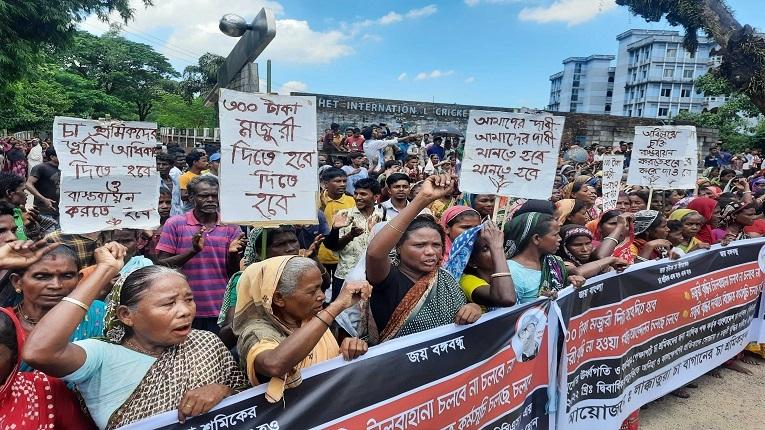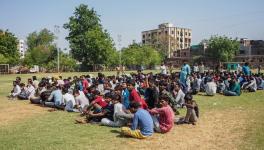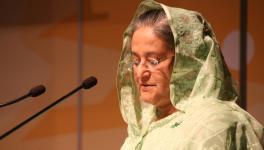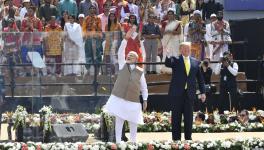Bangladesh Tea Workers on Indefinite Strike as They Await Wage Revision

The tea workers in Bangladesh are holding an indefinite strike on the call of the Tea Workers Union in 167 tea plantations across the country, including in Sylhet and Chittagong, demanding an increase in wages. The strike was started on August 13 at 6 am by tea workers simultaneously from across the country.
Raju Goala, president of Sylhet Valley of Bangladesh Tea Workers Union, told the media, "We have been protesting since August 8 to demand that the daily wage be increased from Rs 120 to Rs 300." The Labour Department had organised a conciliation meeting with the tea plantation owners and workers on Thursday, August 11, regarding the demands of the Bangladesh Tea Workers Union. But none of the owners came to the meeting. The meeting ended without a decision. As a result, the tea garden workers have started an indefinite strike on Saturday.
Tea workers in Bangladesh are currently paid a daily wage of Rs 120. They have been demanding that it be increased to Rs 300. The workers have held peaceful programmes – such as human chain and strikes – many times in the past to raise their demands. Discussions with Bangladesh Tea Sangsad, an organisation representing tea plantation owners, have also been presented.
Workers' wages have not increased due to the absence of new contracts. In June this year, a meeting was held between the leaders of the tea workers' organisation Bangladesh Cha Sramik Union and the owners' organisation, Bangladesh Tea Sangsad. The labour leaders proposed to increase the daily wage of workers to Rs 300 at the meeting. Later, the Tea Sangsad leaders proposed to increase wages by only Rs 14 to Rs 134. However, labour leaders rejected the proposal as it was not satisfactory.
No decision was reported from the owners’ side for over a month following the meeting. Then, from August 8 to 12, the workers went on strike for two hours every day. Having still not received a response from the owners, a full-day strike for an indefinite duration was started across the country on August 13.
Regarding the movement of the tea workers, the general secretary (acting) of the Bangladesh Tea Workers Union, Nirpen Pal, told the media that the prices of daily necessities are constantly increasing. But tea workers in Bangladesh are working for a wage of Rs 120 to date. The last contract between the leaders of the Bangladesh Tea Workers Union and Bangladesh Tea Sangsad expired in December 2020. Nineteen months have passed since, but the owners have not signed a new contract with the workers.
Indicating that there should be no violence in the workers' movement, Pal said, "We don’t want any unrest. We want our rights. Our workers are no longer able to survive due to the increase in the price of everything. Therefore, I am drawing the attention of the owners to save the workers by making their wages Rs 300 as soon as possible.”
However, the owners are calling the current movement of tea workers “illegal”. At the same time, they are expressing different views on the duration of the contract.
In this regard, Golam Mostafa Shibli, the general manager of Finley Tea Company's Bharaura (Srimangal, Moulvibazar, Sylhet) Division, said that discussions are going on between the tea plantation owners and the tea workers’ union leaders. The deadline for wage increases as per the agreement has not yet expired. The strike by workers to demand an increase in wages is illegal, according to him.
The tea sector of Bangladesh involves about 2 million tea communities in 167 tea plantations. Although there have been many changes in various sectors in the past, the livelihood of the tea workers community has not improved much. While the wages or salaries of all classes of workers in the country are increasing, the wages of tea workers have not increased significantly.
In Bangladesh, the minimum daily wage for the whole country is Rs 300 at the current market price. Depending on the location and occupation, the daily wage is anywhere between Rs 300 and Rs 800. On the other hand, the wages of the tea workers have been only Rs 120.
In the last 15 years in Bangladesh, the daily wage of tea workers has increased by only Rs 88. During the 14-year rule of the current Awami League government, the daily wage of tea workers was increased by only Rs 72, to Rs 120.
After various movements of tea workers in Bangladesh, the first wage was increased from Rs 32 to Rs 48 in 2005. Then in 2012, the current government increased it to Rs 65. In 2015, the wages of workers stood at Rs 79 and since January 2017, the wages of workers were increased to Rs 85.
Meanwhile, in view of the long-standing agitation and demands of the tea workers, the present government has given them two bonuses – for Durga Puja and Dol Purnima (Dul Praja or Fagua festival), adding up to Rs 4,250. The striking workers have demanded an increase in the bonus amount as well.
Get the latest reports & analysis with people's perspective on Protests, movements & deep analytical videos, discussions of the current affairs in your Telegram app. Subscribe to NewsClick's Telegram channel & get Real-Time updates on stories, as they get published on our website.
























